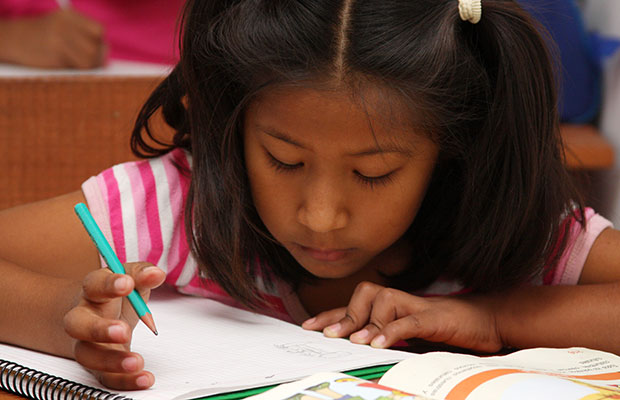
Nurturing the Potential of Girls through Education
Far too often in developing countries, females are stigmatized as being second-class citizens. And while the reasons are many, the results are the same: a once-bright potential stifled by disempowerment, ultimately trapping girls in a lifetime of poverty and discrimination.
“Young women and girls face many disadvantages and barriers, including going to school and achieving financial independence,” explains Father Mark Hyde, director of Salesian Missions. “In turn, a lack of education exerts a negative ripple effect on a girl’s life and future opportunities.”
For example, societal norms often favor male children. In many cases, boys (seen as more valuable) are sent to school while girls are sent to work. In other cases, families who otherwise wish to send their daughters to school are too poor to pay the fees. And gender-based violence is a very real threat for the millions of vulnerable girls who are unable to attend school. Attacks on students, teachers and school buildings are a strong deterrent to being in the classroom.
“Of course, the longer a girl is out of school, the more difficult it becomes for her to start,” says Fr. Mark. As a result, one in seven girls in the developing world gets married before her 15th birthday. Soon, she finds herself responsible for a growing family and any dream of an education quickly fades.
“This is why it is extremely important that every girl has an equal opportunity for an education,” he urges. “We know that young women who have completed high school are six times less likely to marry at a young age. They are also more likely to achieve financial independence, control their own futures, and participate in important decisions that impact themselves, their families and society as a whole.”
Globally, more than 62 million girls are out of school. Salesian missionaries are therefore committed to reversing this trend, one girl and one young woman at a time.
In Bolivia, for example, Casa Maín offers shelter, meals, and education to 160 girls who formerly lived on the streets. They range from elementary school children to university students. In addition to traditional classwork, the girls and young women learn life skills such as communication and conflict management, as well as professional skills such as typing and computer literacy.
In the Dominican Republic, the Madres Project addresses the root causes of homelessness among women and children, and teaches mothers the skills to find decent work and improve their living conditions. Participants can take courses in health care and human rights, while working toward basic literacy.
And in Sierra Leone, Salesian missionaries at Don Bosco Fambul in Freetown have been operating a girls’ shelter for the past three years. Geared specifically toward young women who have survived violence, participants have the opportunity to enroll in vocational training programs and life skills education that helps them understand their rights. As a result, they are able to improve their confidence, overcome discrimination, and find and retain employment.
These are just a few of thousands of examples of Salesian-run programs that help educate and empower impoverished and marginalized girls and young women around the world.
Young girls and women are the backbone of the family structure,” adds Fr. Mark. "By providing women with education, training skills and support, families and communities become stronger."
Our mission empowers girls through education and opportunity. What’s your mission?

